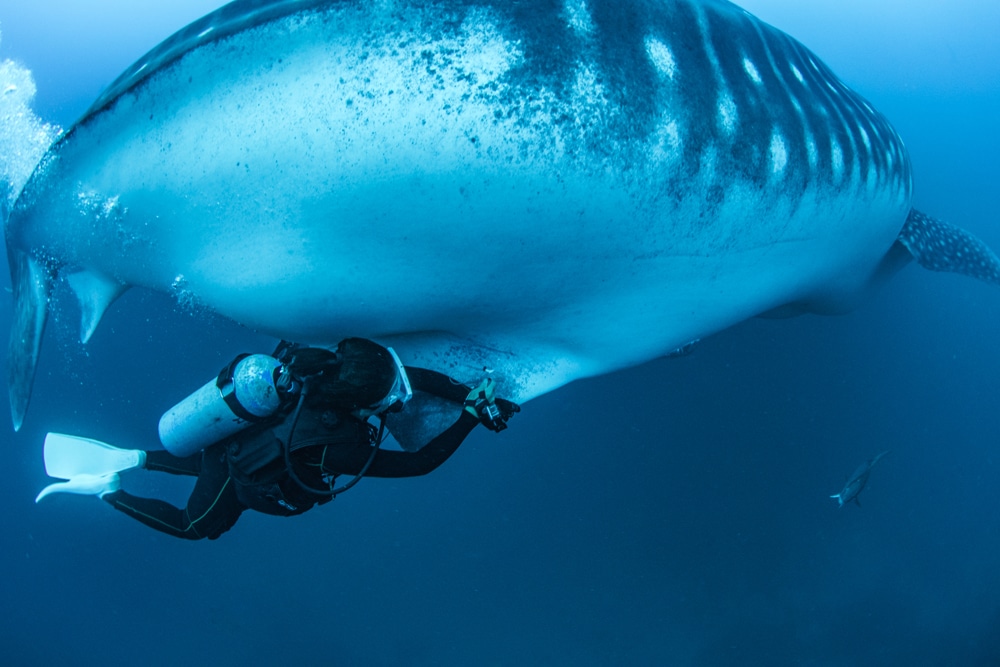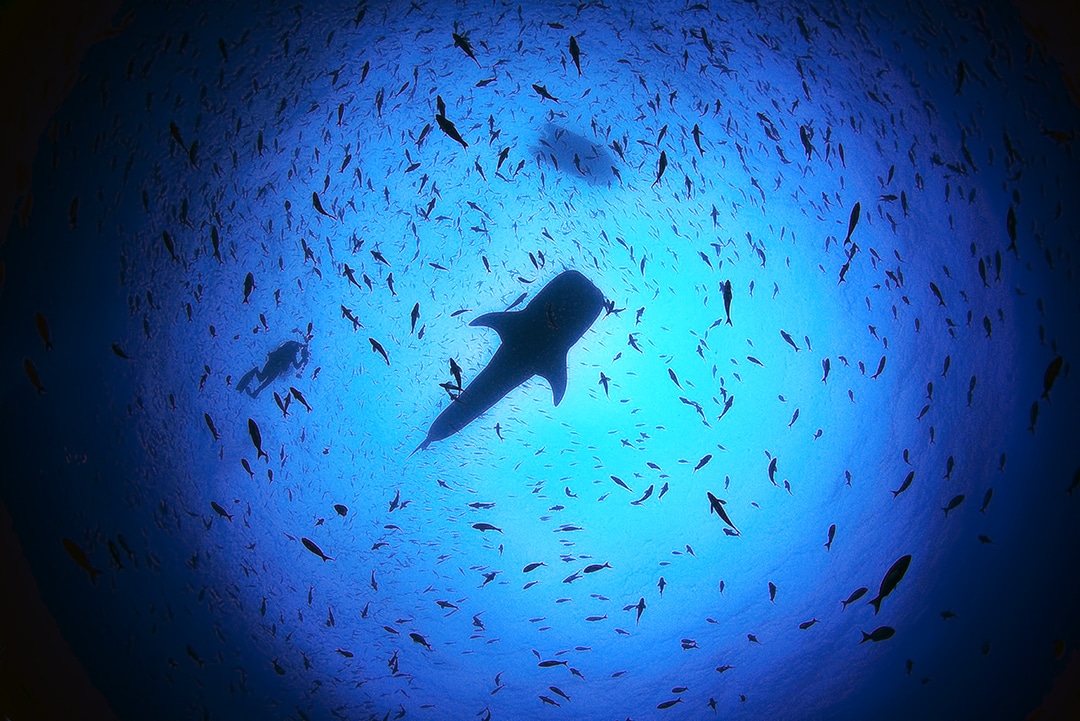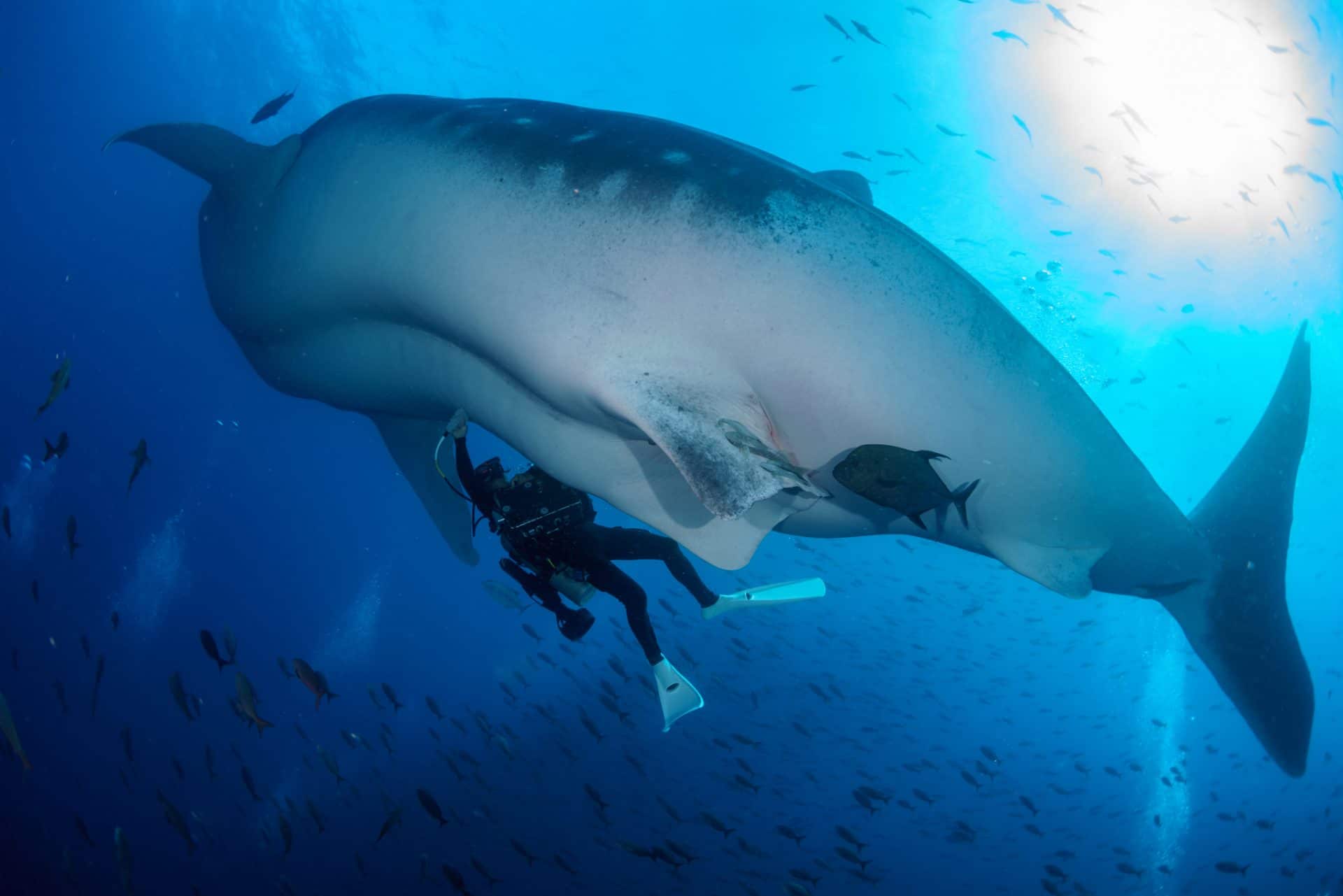News
Underwater ultrasound & first ever blood sampling on adult Whale Sharks
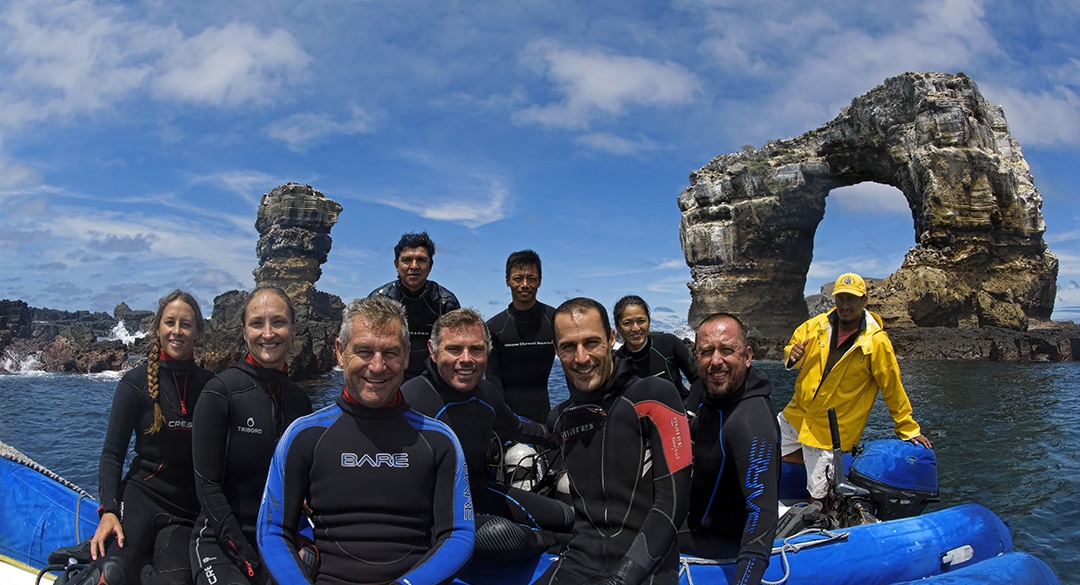
 Innovative techniques used on whale sharks in the Galapagos to find out more about their reproduction
Innovative techniques used on whale sharks in the Galapagos to find out more about their reproduction
Researchers in the Galapagos have successfully completed ultrasounds on free-swimming whale sharks, and taken blood samples from adult whale sharks for the first time ever in the wild. The incredible results allowed them to see and identify reproductive organs, such as the ovaries, and even developing follicles. These technologies hold promise for finally unlocking the mystery of breeding in the world’s largest sharks.
A team of global whale shark experts, comprised of scientists and conservationists from the Galapagos Whale Shark Project (Ecuador), Galapagos National Park (Ecuador), Okinawa Churashima Foundation (Japan), University of San Francisco/Galapagos Science Center (Ecuador) and the Marine Megafauna Foundation (USA), has just returned from a two-week expedition to Darwin Island, in the far north of the Galapagos Archipelago.
This remote volcanic island is one of the few places where huge adult female whale sharks, up to 14 m (45 ft) in length, are commonly seen each year. The main aim of the expedition was to assess the sharks’ reproductive state.
Jonathan R. Green, the expedition leader and founder of the Galapagos Whale Shark Project, notes: “Almost nothing is known about the reproduction of these giant sharks. After I first saw these huge female whale sharks in the far north Galapagos, I realised that this was a great opportunity to learn more. We’ve been able to put together an experienced team to research sharks in this remote area, one of the world’s most isolated dive sites.”
Dr Simon Pierce, an expedition member from the Marine Megafauna Foundation, explains further: “Whale shark breeding is a mystery. Only one pregnant shark has been physically examined so far, back in 1995 in Taiwan. That ‘megamamma’ shark had 304 little whale shark eggs and pups inside, all less than 60 cm in length.”
The team conducted scans using a 17 kg ultrasound system in a waterproofed case. Whale sharks have tough protective skin, more than 20 cm thick on some individuals, so the 30 cm penetration of the ultrasound waves proved a challenge – not to mention the difficulty of carefully checking the whole belly area of a gigantic shark while it is swimming. Dr Matsumoto had to use a propellor system mounted on his air-tank to keep up with the sharks.
“We use some interesting technology anyway, but working with the Okinawa team was something else”, commented Dr Pierce. “I felt cool by association. We saw dive groups a couple of times at the site, and I can only imagine what they thought – why is that guy diving with a briefcase? And a jetpack?”
Dr Matsumoto reports that the initial results were promising: “We confirmed the presence of follicles in the ovaries but none of the images captured embryos or egg capsules inside the uterus. These adult female sharks we saw at Darwin Island might be on their way to mate further offshore. I am confident that we can judge the sexual maturity, and probably also determine the pregnancy of whale sharks in the field, using the underwater ultrasound”.
The researchers attached satellite-linked tags to the sharks to track their onwards movements. Professor Alex Hearn from the University of San Francisco/Galapagos Science Center explains: “We’ve tagged whale sharks in Galapagos before, but there are lots of predatory sharks at Darwin and they often try to eat the tags, which can rip them out of the whale sharks almost immediately. To reduce early tag loss, we tried a different method on this trip, clamping the tags to the tip of the dorsal fins. All tags are transmitting well, so we should get great information on where these sharks swim over the months to come.”
Project member Dr Alistair Dove, from Georgia Aquarium, notes that these tags could document some amazing behaviours: “Whale sharks are already known to be the deepest-diving of all fish. The current depth record is 1,928 m – well over a mile – set by a juvenile whale shark. Larger, older animals can generally dive deeper than young smaller ones, so perhaps we will challenge that record.”
Kiyomi Murakumo, from Okinawa Churashima Foundation, successfully collected blood samples from six adult sharks – no easy job. Her colleague, Dr Ryo Nozu, analyzed the results immediately following the trip: “Sex steroid hormone levels in the blood are an excellent way to monitor reproduction in individual sharks. This study measured levels of estradiol, progesterone and testosterone of wild, adult female whale sharks for the first time in the world. Estradiol could be associated with follicular development, and progesterone could be involved in ovulation and pregnancy. Over time, as we sample more whale sharks, we can build up a complete picture of their reproductive cycle by combining the blood sampling with the ultrasonography.”
Jonathan R. Green added: “These big female sharks are not going to give up their secrets easily. One thing is clear: there’s a lot of work still to do to understand the reproductive processes of this endangered species. However, this trip proved that it is possible to research their breeding in the wild. We’ll continue to hone our techniques and build upon this knowledge, as we need to understand these enigmatic sharks and protect them through their life cycle.”
This project was supported by Galapagos Conservation Trust, Planeterra Foundation and Temperatio.
Photo Credit: GWSP page – www.
For more information about the Marine Megafauna Foundation please visit their website by clicking here.
News
Dive Worldwide Announces Bite-Back as its Charity of the Year

Over the next 12 months, specialist scuba holiday company Dive Worldwide will be supporting Bite-Back Shark & Marine Conservation with donations collected from client bookings to any one of its stunning dive destinations around the world. The independently-owned operator expects to raise £3000 for the UK charity.
Manager at Dive Worldwide, Phil North, said: “We’re especially excited to work with Bite-Back and support its intelligent, creative and results-driven campaigns to end the UK trade in shark products and prompt a change in attitudes to the ocean’s most maligned inhabitant.”
Bite-Back is running campaigns to hold the media to account on the way it reports shark news along with a brand new nationwide education programme. Last year the charity was credited for spearheading a UK ban on the import and export of shark fins.
Campaign director at Bite-Back, Graham Buckingham, said: “We’re enormously grateful to Dive Worldwide for choosing to support Bite-Back. The company’s commitment to conservation helps set it apart from other tour operators and we’re certain its clients admire and respect that policy. For us, the affiliation is huge and helps us look to the future with confidence we can deliver against key conservation programmes.”
To launch the fundraising initiative, Phil North presented Graham Buckingham with a cheque for £1,000.
Visit Dive Worldwide to discover its diverse range of international scuba adventures and visit Bite-Back to learn more about the charity’s campaigns.
MORE INFORMATION
Call Graham Buckingham on 07810 454 266 or email graham@bite-back.com
Gear News
Scubapro Free Octopus Promotion 2024
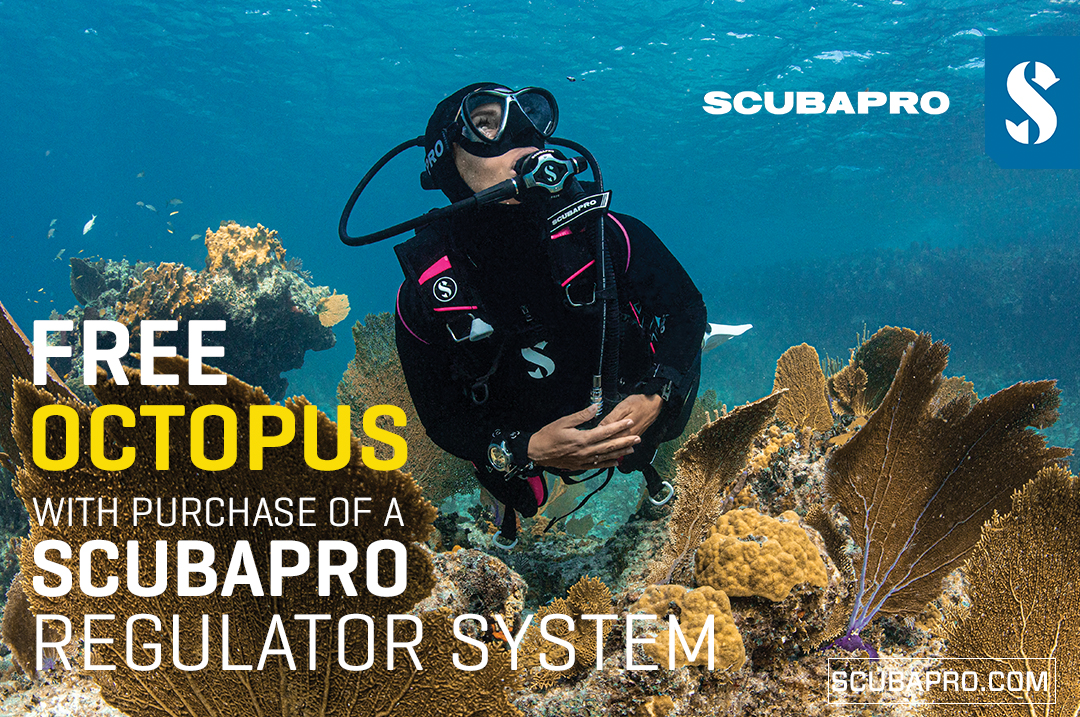
Free Octopus with every purchase of a SCUBAPRO regulator system
Just in time for the spring season, divers can save money with the FREE OCTOPUS SPRING PROMOTION! Until July 31st SCUBAPRO offers an Octopus for free
with every purchase of a regulator system!
Get a free S270 OCTOPUS with purchase of these combinations:
MK25 EVO or MK19 EVO with A700
MK25 EVO or MK19 EVO with S620Ti
MK25 EVO or MK19 EVO with D420
MK25 EVO Din mit S620Ti-X
Get a free R105 OCTOPUS with purchase of the following combinations:
MK25 EVO or MK19 EVO with G260
MK25 EVO or MK17 EVO with S600
SCUBAPRO offers a 30-year first owner warranty on all regulators, with a revision period of two years or 100 dives. All SCUBAPRO regulators are of course certified according to the new European test standard EN250-2014.
Available at participating SCUBAPRO dealers. Promotion may not be available in all regions. Find an authorized SCUBAPRO Dealer at scubapro.com.
More information available on www.scubapro.com.
-

 News3 months ago
News3 months agoHone your underwater photography skills with Alphamarine Photography at Red Sea Diving Safari in March
-

 News3 months ago
News3 months agoCapturing Critters in Lembeh Underwater Photography Workshop 2024: Event Roundup
-

 Marine Life & Conservation Blogs3 months ago
Marine Life & Conservation Blogs3 months agoCreature Feature: Swell Sharks
-

 Blogs2 months ago
Blogs2 months agoMurex Resorts: Passport to Paradise!
-

 Blogs2 months ago
Blogs2 months agoDiver Discovering Whale Skeletons Beneath Ice Judged World’s Best Underwater Photograph
-

 Gear Reviews2 weeks ago
Gear Reviews2 weeks agoGEAR REVIEW – Revolutionising Diving Comfort: The Sharkskin T2 Chillproof Suit
-

 Marine Life & Conservation2 months ago
Marine Life & Conservation2 months agoSave the Manatee Club launches brand new webcams at Silver Springs State Park, Florida
-

 Gear Reviews3 months ago
Gear Reviews3 months agoGear Review: Oceanic+ Dive Housing for iPhone


